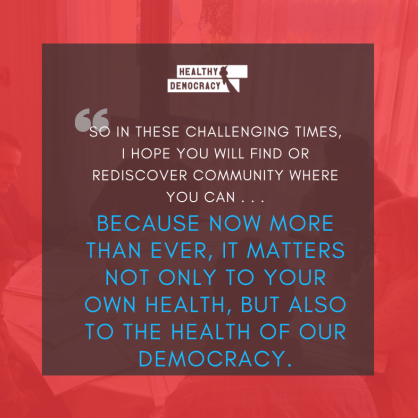I wanted to take a moment this month, in this extraordinary time in our country, to do a simple check in with our fellow democracy advocates. One of the things that the current health crisis in the United States has done is to remind us that we are all in this together, just as we are bound together by and through our democracy, if often imperfectly. It’s easy to forget sometimes.
Many of you know that Healthy Democracy has been running a small portfolio of programs under the heading “Democracy as Community” for the past few years – which includes things like Community Oregon, Civic Saturdays, and other urban/rural bridging experiences. That phrase, “democracy as community”, has been a point of reflection for me lately. In fact, I wrote this in an email to a dear friend a couple of weeks ago:
I wonder if this suspension of action (that is, after one goes out and buys all the toilet paper that makes one feel safe) isn’t one of those inflection points, an enforced remembrance of the importance of community, our “inescapable web of mutuality”, and our obligations to one another regardless of circumstance. To add to the surrealness of our present condition, it is actually snowing in Portland today. Snow events are one of the few things that can get Portlanders to stop and pause even for just a day and tend to our often neglected ties to one another. Today’s snow will go in a day; the virus will be with us for far, far longer. Thus I am caused to wonder: can we sit with our discomfort and inconvenience – and unavoidable truth of how this crisis impacts different parts of our community so dreadfully unevenly – long enough to be finally and truly changed by this forced gaze into such a disconcerting if illuminating mirror? (Yes, this is what I wonder while I am washing my hands for the 100th time today…)
It is now 14 days later, and while these questions are still with me, I have seen evidence in the silence of a quieted-down world that the beauty and necessity of our interconnectedness is not lost to us. Far from it.
We have been asked to do something hard. More to the point, we are being asked to do this for people most of us will likely never know or see. It’s like in the Citizens’ Initiative Reviews that we’ve run for a decade now, where ordinary citizens do incredibly hard and important work on behalf of literally millions of people – their fellow voters around the state — they do not personally know. And they do it with seriousness and earnestness and a sense of mission, almost as though lives depended on it.
Here again we citizens – not just a few select people, but ALL of us – are doing something important on behalf of others whose fate we have agreed is intertwined with our own. We don’t need to know who they are, we just need to think that they matter.
So now I have a new set of questions:
- What can we learn about ourselves – individually and collectively – from this unique moment in time?
- What does it say about the possibilities for our democracy?
- Finally, can there be any doubt about how linked the concepts of community and democracy really are? If we are working to strengthen one, can we understand that we are by default strengthening the other?
It seems to me that our sense of community defines how we show up in our democracy. It determines whether we engage with fear or compassion, with judgment or empathy, with anger or understanding.
So in these challenging times, I hope you will find or rediscover community where you can – whether it is next door, at the park, online, or six feet away from someone at the grocery store. Because now more than ever, it matters not only to your own health, but also to the health of our democracy.


